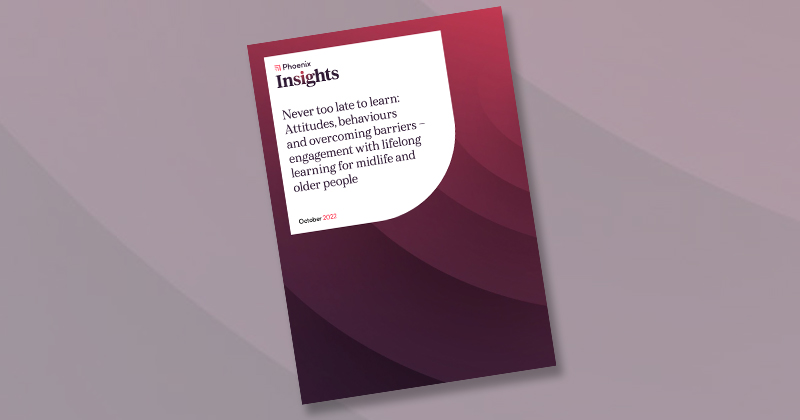The government should reframe the language and branding of the lifelong loan entitlement (LLE) as researchers found the term “lifelong loan” to be unappealing to potential learners.
Think tank Phoenix Insights has published research exploring the challenges people face to retrain throughout their life, and found that the key reason is because adults do not want to take on more debt.
It warns that because of this, the government’s proposed lifelong loan entitlement (LLE) will require “focused tweaks” to entice midlife and older workers to take out the loans to retrain.
The LLE, due to be rolled out in 2025, will provide individuals with the equivalent of four years of post-18 education to use over their lifetime. Funding will be available to study at levels 4 to 6, for both modular and full-time study at either colleges or universities.
Decline in adult learning
A decade long decline in adult learning is the driving force behind the scheme.
Phoenix Insights’ research, carried out by Public First, found that lack of knowledge around how loans work and the benefits of retraining are major barriers to overcome.
The think tank said the Department for Education should explore “creative ways” to highlight financial incentives for people in midlife to engage with lifelong learning, including alternative or additional means of financing the LLE.
While the report authors said they do not expect government to offer a grant for 100 per cent of costs, they believe that ministers could introduce “part subsidies or provider or employer bursaries/scholarships, particularly in skill shortage areas”.
“There is precedent for this approach in sectors such as the NHS and teaching (e.g. the NHS bursary and funded teacher training places),” the report said.
Phoenix Insights also called on the government to review the language used when discussing learning opportunities for adults of different ages.
Associations with low pay
It found that words such as “apprenticeship” and “internship” have “strong associations with low pay and ‘starting at the bottom’ – so rephrasing opportunities to lean on preferences for framing such as ‘upskilling’, ‘retraining’ and ‘on-the-job training’ will help give midlife and older people more confidence to engage”.
A renaming and branding of the LLE scheme to put it in a “more positive framing” has also been suggested, after the phrase “lifelong loan” was “widely viewed as negative and unappealing”.
The report added that having the scheme “too closely associated with government was also seen as a negative”, so the policy will “need to be delivered in an impartial and independent way that prioritises choice for the learner”.
Phoenix Insights also said that accurate information about the quality and outcomes of courses available to adult learners to support them in their careers – including potential new career routes or the number of vacancies available linked to the qualification studied – will be vital.
Risk or gamble
“Midlife and older people consider retraining to be a ‘risk’ or ‘a gamble’ and need to know what they can expect if they successfully complete a course – the presence of a ‘safety net’ as well as whether the course would be ‘worth it’ both financially and otherwise (e.g., a guaranteed job role or commitment to progression within their current role),” the report said.
Reza Schwitzer, associate director at Public First, said: “Our research shows that while people like the idea of lifelong learning, they don’t like the idea of a lifelong loan. Fear of taking on additional debt will be a huge barrier to mid- and late-career workers embracing the LLE, which is why we think there should be clearer assurances of job and career progression for everyone who retrains via the scheme.
“With some focused tweaks, the LLE can become a vital tool in helping over 40s make the shift they need o earn more, work longer, and contribute to a productive, growth economy.”
A DfE spokesperson said: “From 2025 our LLE will provide individuals with a loan equivalent of four years of post-18 education to use flexibly over their lifetime. We consulted on the LLE earlier this year and continue ongoing engagement with the sector. We will publish our response in due course.”















If the sector embraces and promotes loans then it loses all credibility when it argues for being a positive force for social mobility.
It’s really simple, loans put the less affluent at a numerical disadvantage. Fundamentally, loans will accelerate the growing wealth divide between the haves and the have-nots.
It worries me that a significant proportion of adults have maths skills below level 2 and that the Further Education sector seems willing to be an enabler of flogging loans.